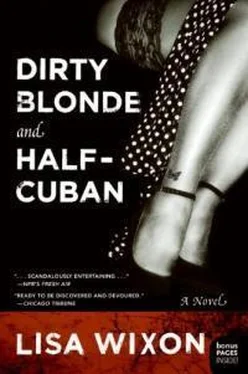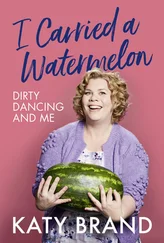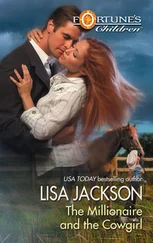Lisa Wixon - Dirty Blonde and Half-Cuban
Здесь есть возможность читать онлайн «Lisa Wixon - Dirty Blonde and Half-Cuban» весь текст электронной книги совершенно бесплатно (целиком полную версию без сокращений). В некоторых случаях можно слушать аудио, скачать через торрент в формате fb2 и присутствует краткое содержание. Жанр: Современная проза, на английском языке. Описание произведения, (предисловие) а так же отзывы посетителей доступны на портале библиотеки ЛибКат.
- Название:Dirty Blonde and Half-Cuban
- Автор:
- Жанр:
- Год:неизвестен
- ISBN:нет данных
- Рейтинг книги:4 / 5. Голосов: 1
-
Избранное:Добавить в избранное
- Отзывы:
-
Ваша оценка:
- 80
- 1
- 2
- 3
- 4
- 5
Dirty Blonde and Half-Cuban: краткое содержание, описание и аннотация
Предлагаем к чтению аннотацию, описание, краткое содержание или предисловие (зависит от того, что написал сам автор книги «Dirty Blonde and Half-Cuban»). Если вы не нашли необходимую информацию о книге — напишите в комментариях, мы постараемся отыскать её.
Dirty Blonde and Half-Cuban — читать онлайн бесплатно полную книгу (весь текст) целиком
Ниже представлен текст книги, разбитый по страницам. Система сохранения места последней прочитанной страницы, позволяет с удобством читать онлайн бесплатно книгу «Dirty Blonde and Half-Cuban», без необходимости каждый раз заново искать на чём Вы остановились. Поставьте закладку, и сможете в любой момент перейти на страницу, на которой закончили чтение.
Интервал:
Закладка:
We’re talking about religion and politics, because even controversial issues are less sensitive than a conversation about our pasts, and the future they may decide. I’ve dreamed about this moment for so long, but never anticipated my mouth would be dry and no questions could tumble from my lips. I think of nothing to say. My vision is reduced to one focused line, and my knees begin to hum.
“Where do we begin, Alysia?” asks my father quietly.
“You start first,” I reply. “At the beginning, the Spanish embassy, am I right?”
A smile crosses his face. “There was flamenco. I couldn’t keep my eyes off her.” And so starts the first thread in a long unraveling.
When breakfast plates are cleared, we sit until lunch, picking over salad and soup, and when lunch is over we move to the terrace with café con leche.Later, we wander the former Jewish quarter, on Calle Acosta, which once housed kosher bakeries and butcheries. Later, still talking, we have dinner and Hemingway daiquiris. It’s a free-for-all, a putting together of the last pieces of a jigsaw puzzle of our entwined histories. It’s the making of connections in times and places. The story begins to form, its shape appears, and a clarity is realized.
There were questions from him about my mother, and the contents of her diaries. There was the news of her death, and the way the tears came down his face, and the long and soulful silence that followed. There was the story of John. Finally, a silence.
“Walrus?” I ask.
“Who?” says José Antonio.
“El Gordo, who has been following me.”
“ Ay,Salvador,” he says, laughing. “Salvador’s an old friend.” His laughter cools, and he drinks from his glass of water. “There are no secrets here, as you must have gathered. When you signed up for the university, you were on a special list, and it was flagged in the computers. Someone in the Interior phoned me, a good friend. I asked Salvador to keep an eye on you. Guess he did a good job, he was once a G-2 man.”
“An eye on me?”
“To make sure you didn’t leave Cuba before I had a chance to find you. If you were going to leave early, I had instructed him to approach you and tell you about me.”
José Antonio fiddles with his water glass, concentrating on the beads of condensation dripping down it.
“Had I any idea your money was stolen…It just never occurred to me you would have been in financial trouble.” He looks up at me now. “If Salvador had told me, I would have been here the next day, I hope you believe that.”
His eyes are full of deep remorse and it’s then I understand he knows about my nighttime wanderings.
“We don’t have to talk about everything,” I say, finally speaking.
“Let me just say one thing about this: your coming to find me, and doing everything that entailed, has touched me in a way I can’t describe. I must do all the work now, Alysia. Being your father for the rest of my life is a pleasure I can’t wait to experience in full.”
“If Walrus—okay, Salvador—knew why I was here, why didn’t he just take me to Calle M?”
“He didn’t know why you were in Havana. No one did. You were signed up as a student, remember? I didn’t know what you knew, or what your mother told you, or why you were here. I suspected. I hoped. I prayed you were looking for me…But you never went to Calle M.I assumed if you were here to find me, your mother would have told you all you needed to know. Of course now that I know of her death…” His voice trails off, but I’m more confused and I need a moment to sort my feelings.
José Antonio coughs. “What I haven’t told you”—he coughs again and takes a sip from the glass—“is that I cannot leave Cuba now; I won’t be allowed back in the U.S. That’s why it’s taken me so long to be here. Had I been able to leave when you first arrived in Havana, I’d have been on the first plane. You must know this, mi niña.”
His words hang in the air, and the waiters, who’ve long left us alone, look over because I stand up abruptly, spilling my coffee.
“Sit down, please,” says my father, standing up as well. “I’ll explain.” But I’m upset and afraid, and when we are seated again, he begins slowly. “When I left through Mariel, I was processed in Miami at Immigration. We camped at the Orange Bowl, the football stadium, like many others. Immigration asked if I had worked for the Ministry of the Interior and, of course, because I had, as a translator, I said yes. What this means is that although my job was mundane, and I knew no state secrets—I translated from Spanish to Russian and German,” he sighs heavily, “I’m considered suspect simply because I was employed through the Interior. So I was allowed to stay in the U.S., but it meant I was monitored, and told that if I returned to Cuba even for a short visit I wouldn’t be allowed back in the U.S. There are many Cuban operatives living in America. But I’m not one of them.”
It’s still too much to process, and so I take a deep breath. Slowly, I say this: “Why all the delays in coming here?”
“The reason”—his voice is crackling now—“I took so long to get here is that I applied for paperwork to overturn that decision, but I was rejected. I did what I must: I’ve sold my home and shut down my affairs. I’m afraid my coming here is forever, Alysia.”
“Why didn’t you tell me?” I ask. “My visa here ends in a few weeks, I could have met you in the U.S.—”
But he cuts me off. “I’m sorry, Alysia. My only goal in living in America was to be with you while you grew up. But your father, John, made that impossible. Now that I’ve found you— mira,in fifteen, twenty years I’ll be an old man. My father died in his sixties, as did his father before him. I want to be here with my family now. I don’t want to die without ever seeing them again. I don’t want to grow old with strangers. No matter how comfortable life can be in America.”
“But it’s so hard to live here,” I say, incredulous. “Why would you chooseto wait in lines and suffer blackouts and never have toilet paper…” I drop my head on the table. I can’t believe what I’m hearing. It’s way too much.
He takes my hand, and with the other gently lifts my head. “I have moderate savings and a pension that starts in a few years. I can make do.” I can’t look at him, and tears are starting to roll down my face and splatter on my borrowed clothes.
“Alysia,” he says, his voice soft. “I’ve changed my whole life to look for you. I went on a boat across the Florida Straits. I left my family for twenty-three years. I made a life in Miami, missing my Havana every day. It was all to find you. Pero,now I’ve found you. Gracias a dios.”
“It’s so hard to live here,” I repeat.
“My wife, she’s a lovely woman, a cubana,she will be joining me in a few months. It is her wish, too, to return here and be with her family. We are prepared for the sacrifices.” But he says this without looking me in the eye.
Then he takes my other hand. “Alysia, m’ija,blackouts and toilet paper are inconsequential, at least in the big picture. I love my country and I can’t—I won’t—wait until it’s perfect to live here. My body may not make it that long. I have the same feeling about this system as I’m sure you’ve come to have. It’s imperfect and sometimes very damaging. But I won’t nothave another egg in my country. I won’t notlive near the house of my mother. I won’t notwake up every day to feast on the beauty of mi patria.I won’t die with hatred and regret. I’ve put those feelings aside and will make the sacrifices I need to make to be here with my family. I hope— dios míodo I hope—that it includes you, mi niña.”
We don’t speak for a long while. There’s nothing in me that doesn’t understand what my father is saying, but I’m not certain I can live in Cuba, and I’m not certain I can live without him. Not after having finally found him.
Читать дальшеИнтервал:
Закладка:
Похожие книги на «Dirty Blonde and Half-Cuban»
Представляем Вашему вниманию похожие книги на «Dirty Blonde and Half-Cuban» списком для выбора. Мы отобрали схожую по названию и смыслу литературу в надежде предоставить читателям больше вариантов отыскать новые, интересные, ещё непрочитанные произведения.
Обсуждение, отзывы о книге «Dirty Blonde and Half-Cuban» и просто собственные мнения читателей. Оставьте ваши комментарии, напишите, что Вы думаете о произведении, его смысле или главных героях. Укажите что конкретно понравилось, а что нет, и почему Вы так считаете.












